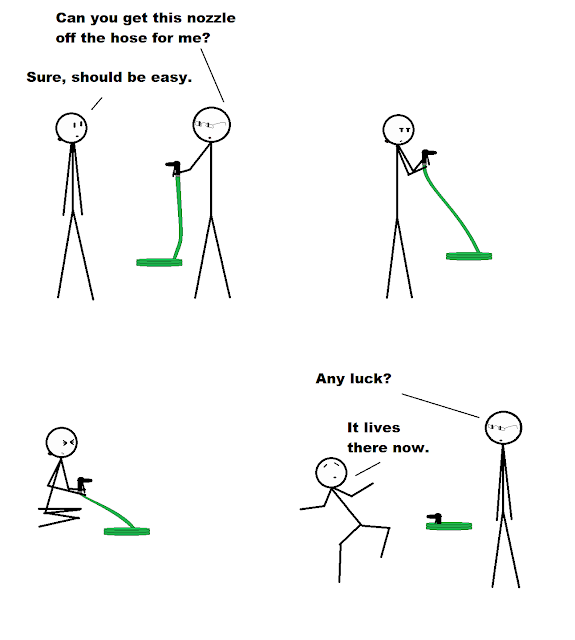FYI: blogger seems to be emailing me comments again, so yay?
Saturday, April 29, 2023
Thursday, April 27, 2023
Language Of Confusion: Warning, Etymology Ahead, Part II
All these words are from the Proto Indo European wer-,
to cover, which gave us things like
warren and warrant, and also things like garnish because words are dumb. And
this week is more of the same.
Now, like I said, wer- meant to cover. Cover itself showed up in the mid twelfth century, so it’s pretty dang
old. It comes from the Old French covrir, and classical Latin coperire,
to cover.
The co- comes from the prefix com-, though it’s thought to only be intensive
here, while the rest is from operire, to close or cover.
That’s taken from the Proto Indo European op-wer-yo-, where the op-
means over and is the origin of the prefix epi-,
and wer- is to cover. To cover over just means to really cover
something. And they threw the com- prefix in there to emphasize it even more.
Covert is also from cover. It showed up in the fourteenth century from the Old French covert, which is the past participle of covrir. Then
there’s discover, also from the fourteenth century.
In Old French, it’s descovrir, which is taken from the Medieval Latin discoperire, which you may notice is
also just cover with the dis- prefix. Dis- means “the opposite of”,
so discovering is the opposite of covering something. I can see that.
Then there’s curfew. Really. It showed up in the early fourteenth century meaning the ringing of a bell
at a fixed hour, which by the nineteenth century morphed to mean the
restriction of movement after a certain time. The word is from the Anglo French coeverfu, from the Old French cuevrefeu,
which is from covrir plus the word feu, which means fire—one of the
reasons the curfew bell was rung was to warn people to put out their fires
before going to sleep. A warning to cover your fire now means curfew.
The next word we’ll be looking at—prepare yourselves—is kerchief. Which
is a covering, so I guess you can see how it comes from to cover. It showed up
in the early thirteenth century where it could be spelled kovrechief, and it meant the same thing as
we’d use it as. It’s from the Anglo French courchief, which literally
meant “cover head”. The first part is from couvrir, which is from the
Old French covrir, while the chief part means head, more literally than we use
it these days. Yes, chief once literally meant head,
and it’s from the Vulgar Latin capum, head, classical Latin caput,
again, head,
and the Proto Indo European word for head kaput-, and somehow that’s the origin for kaput, as in dead/broken.
And I can’t even make this up, the reason why is because German took a French phrase
meaning “to make a bonnet” as a way to say you’re taking all the tricks in a
card game, when the French used the phrase in relation to sailing during a
storm. I know it’s not related to cover, which we’re looking at, but it might
be the stupidest etymology I’ve ever read.
Sources
Online Etymology Dictionary
Google Translate
Omniglot
University of Texas at Austin Linguistic Research Center
University of Texas at San Antonio’s page on Proto Indo European language
Dictionary of Medieval Latin
Encyclopaedia Britannica
Fordham University
Online Etymology Dictionary
Google Translate
Omniglot
University of Texas at Austin Linguistic Research Center
University of Texas at San Antonio’s page on Proto Indo European language
Dictionary of Medieval Latin
Encyclopaedia Britannica
Fordham University
Tuesday, April 25, 2023
From The Spamfiles
I’m sure you’re all relieved to know there’s still plenty of
spam.
What is with the double periods? Not quite an ellipsis, not
quite the end of a sentence, and definitely not what’s supposed to go
between words.
While I do feel it’s important to be aware of the signs of a
potential heart attack, there’s no way this isn’t just trying to get me to buy
something, their “heart health trick” I assume.
Honestly, a live show with 30K Ukrainian Beauties is not
what I expected when I read the name “Falcon Heating”.
Sometimes I look at these and say to myself, are there
people out there this actually works on? People who believe that random people
will email them asking to go partners on some scheme? And then I realize the
answer is yes, and that makes me very sad.
“This new follower is reading a book! Maybe she’s real! No,
wait, she’s naked, never mind.”
Saturday, April 22, 2023
Fresh Water
A sequel to this comic. Not kidding, it took her about five seconds.
It seems like she’s less interested in the freshness of the water than just stealing from me.
It seems like she’s less interested in the freshness of the water than just stealing from me.
Thursday, April 20, 2023
Language Of Confusion: Warning, Etymology Ahead, Part I
I’m really pleased with this title, as we’re looking at words related
to warn this week, as well as all the crazy words its related to. Though I
guess in terms of etymology, it’s only slightly above average.
Warn itself comes from the Old English warnian,
which is just warn, no big surprises
there. That’s from the Proto Germanic waronan, which is from the Proto Indo European wer-,
to cover—there are actually other
versions of wer-, which are basically homonyms that have totally different
meanings, some of which I’ve already looked at! But right now we’ll just be
looking at the ones related to the to cover one.
It’s kind of appropriate that to cover would lead to warn. It also
leads to the word warrant, which also gives us warrantee (which is just warrant with an -ee at the end). Warrant showed up in the
thirteenth century, but back then it
meant protector or defender, which makes a lot more sense when you think of to
cover. It took on the meaning of to receive permission from a superior in the
fourteenth century, and then a document conveying authority in the sixteenth
century, and now we don’t use it at all in the original sense. It comes from
the Old North French warant, Frankish warand, and before that the Proto Germanic war-, to warn or guard,
and unsurprisingly that’s from wer-.
But what about warren? You know, like a living space for animals? Yeah,
that’s related. It showed up in the late fourteenth century,
from the Anglo French/Old North French warenne, a hunting
reserve. It’s thought to be from warir, defend or keep, which is also
from the Proto Germanic war-, but man, of words you wouldn’t think would
be related to warn… And this is only the beginning.
That’s literally the last word beginning with W that’s from wer-. Next
is garment, which I’m pretty sure I’ve looked at before but if I did, it was a
long time ago, so whatever. And hey, a garment is a covering! It showed up in
the fifteenth century, though it was
also here as garnement in the fourteenth century. It’s from the Old French garnement, from the verb garnir, to adorn or provide.
It’s weird to think of garment and warn as related, but you can kind of see it.
Garnish is a little more confusing. It showed up in the late fourteenth century, strictly meaning to decorate
or adorn, before also meaning to arm yourself or to embellish, and then in the
sixteenth century it also meant “to warn or serve notice for attachment to
funds” in the legal sense. By the eighteenth century, it was also used to mean
to decorate a table, so that’s three really different definitions that aren’t
used all that much today. Anyway, it’s from the Old French garniss,
which is also from garnir, like in garment. Garnir is from the Frankish warnjan,
from the Proto Germanic warnon, which is related to the origin word of
warn and from wer-. I mean, it makes sense, but wow, what a journey.
Sources
Online Etymology Dictionary
University of Texas at Austin Linguistic Research Center
University of Texas at San Antonio’s page on Proto Indo European language
Tony Jebson’s page on the Origins of Old English
Old English-English Dictionary
Encyclopaedia Britannica
Fordham University
Online Etymology Dictionary
University of Texas at Austin Linguistic Research Center
University of Texas at San Antonio’s page on Proto Indo European language
Tony Jebson’s page on the Origins of Old English
Old English-English Dictionary
Encyclopaedia Britannica
Fordham University
Tuesday, April 18, 2023
From The Spamfiles
Had a nice influx of spam recently.
This probably would have worked better before Netflix ran
their company into the toilet with terrible shows and movies. I do however buy
that they’d be desperate enough to offer ninety dollars to get people to watch
one of their shows.
Probably not a good idea to get a future prediction from someone
who can’t spell future.
This is such a horrifying meeting of racism and sexism. That’s it. That’s all I have to say.
Clearly one of the important things she has to tell me is
not how to use periods. Apparently I’m #62 now.
On a spam post no less! If you poison people with the herbs you give them and they
die, all their diseases do go away, so it’s not incorrect.
Saturday, April 15, 2023
The Answer Is Nothing
Just one of those days weeks months
years.
Maybe I wouldn’t be so stressed and unable to write if I had
enough money to live off of, but unfortunately that’s not going to happen, ha ha, this world is a dystopian nightmare.
Thursday, April 13, 2023
Language Of Confusion: Maximum Carnage, Part V
Last part! Not quite as long as the
last one, because there aren’t as many words that come from the Proto Indo European root sker-,
to cut. Still a bunch, though.
Online Etymology Dictionary
Omniglot
University of Texas at Austin Linguistic Research Center
University of Texas at San Antonio’s page on Proto Indo European language
University of Texas at Arlington
Tony Jebson’s page on the Origins of Old English
Old English-English Dictionary
Fordham University
Tuesday, April 11, 2023
From The Spamfiles
Time for something a lot cheerier than the rest of life:
spam.
5848? Who told you my real name?
A watch can do all that? Call the hospitals! We now have a
fast, cheap tool for heat scans!
Now I’m all bummed that someone really isn’t giving me a
hundred dollars. Thanks a lot, spam.
What’s with the extra vowels added to random words? I’d
rather she answer that question.
The spambots on Tumblr have evolved to using names and
random words, but they’re still throwing in random numbers and letters as if
that’s not the biggest red flag for ANY social media site. This is really
low-effort for them. Try harder!
Saturday, April 8, 2023
The Howling
Real or not, this is the first time in my life I’ve ever
been woken up by howling.
I haven’t been able to find anyone else who heard it (I know one neighbor has dogs but I barely ever see this neighbor, and the dogs have never done this before), so I’m not one hundred percent sure this wasn’t some fragment of a dream—even when I woke up I wasn’t sure. Regardless, it was a weird experience I just had to share.
I haven’t been able to find anyone else who heard it (I know one neighbor has dogs but I barely ever see this neighbor, and the dogs have never done this before), so I’m not one hundred percent sure this wasn’t some fragment of a dream—even when I woke up I wasn’t sure. Regardless, it was a weird experience I just had to share.
Thursday, April 6, 2023
Language Of Confusion: Maximum Carnage, Part IV
We’ve got a bunch more of these
to look at! All are descended from the Proto
Indo European root sker-, to
cut. Though it may not seem like it at times.
First we’re going to look at
shard—all the words this week start with sh, I guess they got rid of the K
sound. It comes from the Old English sceard, which means chipped or broken,
much like a shard is. That’s from the Proto Germanic skardaz,
which is from sker-. A surprisingly sensible origin. Shards are a cut piece of
something!
Sharp comes from the Old English scearp, which just means sharp,
big surprise. It’s from the Proto Germanic skarpaz, meaning it was the
same word as sharp’s origin, but still with a P in place of the D. And that of
course is from sker-, so we still aren’t making any huge leaps here.
Then there’s share, which… yeah,
really. Share. It comes from the Middle English share and
Old English scaeru, a division,
then before that the Proto Germanic skeraz, and that’s from sker-. A
share is a cut of something. I can’t believe this makes sense.
Shore showed up in the
fourteenth century. It’s got a few
possible origins, like the Old English scora/sceor-, which was part of
place names, the Middle Low German schor, shore or coast, and the Middle Dutch scorre, land washed by sea. All are thought to be from the Proto
Germanic skur-o-, cut, which is from sker-, though I don’t see the leap
from cut to washed by the sea. Still, this is etymology, and you know how
backwards it can be.
Nex, shear, like you shear
sheep, so I can pretty much guess how this will go (spoiler: like all of the
above words). It’s from the Middle
English sheren, from the Old English scieran, to cut.
That’s from the Proto Germanic skero-, to cut, from sker-. Yep, that’s
what I thought.
But there’s also sheer, which
has more varied meanings—thin (the mid sixteenth century), absolute or utter (the
late sixteenth century), steep like a cliff (nineteenth century). And before
all that, it showed up in the thirteenth century meaning free from guilt—the day before Good Friday, as in today, is
actually called, not kidding, Sheer Thursday!!! Why such varied meanings? It’s
a bit complicated, but sheer was scir in Old English and meant bright,
pure, or translucent—so thin and absolute make sense, though steep not so much.
Anyway, it’s from the Proto Germanic skeran, which is from sker-. This
was definitely the weirdest one.
Happy Sheer Thursday, everyone.
Sources
Online Etymology Dictionary
University of Texas at Austin Linguistic Research Center
University of Texas at San Antonio’s page on Proto Indo European language
University of Texas at Arlington
Tony Jebson’s page on the Origins of Old English
Old English-English Dictionary
In Depth Germanic Language Studies
History Of The Dutch Language
Online Etymology Dictionary
University of Texas at Austin Linguistic Research Center
University of Texas at San Antonio’s page on Proto Indo European language
University of Texas at Arlington
Tony Jebson’s page on the Origins of Old English
Old English-English Dictionary
In Depth Germanic Language Studies
History Of The Dutch Language
Tuesday, April 4, 2023
April Goals
Oh frig. March is done already? But it sucked!!!
March Goals
1. Actually edit the web serial this time.
Hey, I actually started this! It’s a miracle.
2. Hopefully find some way to recharge. And maybe sleep!
Failed this one. I’m so tired. I’ve heard people say they wake up in the mornings no longer feeling tired but I think that might be a lie.
3. Keep searching for a way to get rid of those
m*****f*****g rounded window corners in everything I try to use on my computer.
Don’t get Windows 11. Stick with 10.
This one’s not my fault, but the fault of Microsoft, who created an operating system designed to inflict torture on people. One of the updates for it literally broke my computer. I had to roll it back, and now it keeps bugging me to download the computer-breaking update. I miss 10 so much. I took it for granted. It was the least awful of all operating systems.
So that was March. It was the worst. I doubt April’s going
to be any better.
April Goals
1. Finish the web serial edits. Not sure I’ll be able to get there, but I should be able to get close.
2. Update my etymology page. You know what a treat this
always is. Stupid Google.
3. Find some way to get my work out there more. Not that I
have any idea how to do this…
Ugh, March. Ugh, April.
What do you want to do this month?
1. Actually edit the web serial this time.
Hey, I actually started this! It’s a miracle.
Failed this one. I’m so tired. I’ve heard people say they wake up in the mornings no longer feeling tired but I think that might be a lie.
This one’s not my fault, but the fault of Microsoft, who created an operating system designed to inflict torture on people. One of the updates for it literally broke my computer. I had to roll it back, and now it keeps bugging me to download the computer-breaking update. I miss 10 so much. I took it for granted. It was the least awful of all operating systems.
1. Finish the web serial edits. Not sure I’ll be able to get there, but I should be able to get close.
Labels:
April Goals,
editing,
goals,
WIP,
writing,
writing goals
Saturday, April 1, 2023
Subscribe to:
Comments (Atom)








